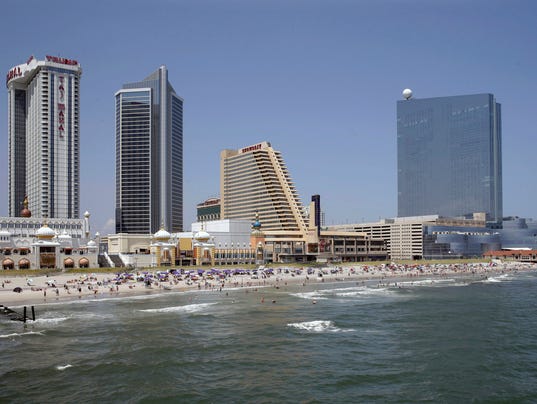A third of Atlantic City casinos in business at the start of this year have shuttered their doors or plan to permanently close as the summer tourist season winds down in a few weeks.
The closings represent job losses for thousands of people — roughly a quarter of the industry's workforce. There were about 9,000 people employed last July at the Atlantic Club, which closed this year, and Revel, Showboat and Trump Plaza, which are in the process of shutting down in the next few days and weeks.
Opened in 1978 as the country's second gambling capital behind Last Vegas, Atlantic City's casino industry is facing mass closings that some analysts believe may be a glimpse of what could happen in New York as the state races to license the building of more casinos.
"Atlantic City is definitely a harbinger," said Roger Gros, an industry analyst and the publisher of the trade publication Global Gaming Business Magazine. "What looks like a golden opportunity one year may not always be there."
Nevada and New Jersey used to be the only states that allowed gambling. But today, some form of casino betting exists in 39 states. The stiff competition, sluggish economy and what some believe is a market overly saturated with casinos has resulted in declining gambling revenues in Atlantic City since 2008.
Casinos at the New Jersey seaside resort are not only competing with one another for the same customers but also with recently opened properties across the Northeast and mid-Atlantic, particularly in neighboring Pennsylvania, where six racetracks with casino gambling and six standalone and resort casinos have opened within the past decade. Two more also are on the way.
In New York, slot machines at Empire City in Yonkers and Resorts World Casino in Queens also have drawn so-called convenience gamblers who otherwise would have traveled to Atlantic City but now have closer betting options.
But many analysts and operators still believe there is room in New York for more gambling sites, particularly destination casinos that offer a mix of table games, slot machines and other entertainment, sometimes described as Las Vegas-style casinos, in addition to other amenities, such as golf courses and water parks.
At the moment, there are nine racetracks that offer slot machines and other types of electronic gambling and five upstate Indian-owned casinos. Last year, New York voters approved a constitutional amendment that would add seven Las Vegas-style casinos — none near New York City for now but some of the proposals are close enough to rattle officials at Empire City casino.
Yonkers Mayor Mike Spano said every time he goes to Albany or speaks to lawmakers, he advocates on behalf of Empire City casino being allowed to expand its gambling operations beyond slot machine-type games, particularly as state regulators look to issue licenses for up to two new full-service gambling resorts in the Hudson Valley and Catskills area, namely in Orange or Sullivan counties. Up to three additional licenses are expected to be issued elsewhere upstate for a total of four across New York state.
Proposals to build a full-service casino in Tuxedo or Woodbury village, Orange County — about 40 to 45 miles from Yonkers — would place Empire City casino at a definite disadvantage.
"My fear is that you allow other gaming to take place around Yonkers — that could hurt us," Spano said.
Empire City officials have already begun actively lobbying against having a full-service casino in Orange County. Spokeswoman Taryn Duffy called moves to build a casino in Orange County tantamount to a "poison pill" because it would pull customers from the Yonkers casino as well as draw gamblers from nearby sites, such as the Catskills.
At the same time, Empire City casino presumably would have a shot at obtaining a full-scale casino license when a moratorium on issuing "downstate" casino licenses expires in about seven years. But some officials said given market forces, seven years might be too long to wait.
"I don't have any imminent concerns, I have long-term concerns," Spano said of Empire City casino. "The raceway is viable. In seven years, is it still viable to expect that an investor will want to put a full gaming facility?"
Starting Sept. 8, casino applicants will go before the New York Gaming Facility Location Board to make their pitch. On that same day, New Jersey Gov. Chris Christie will hold a summit in his state to discuss Atlantic City's future, where officials will presumably talk about possibly expanding casino gambling to the Meadowlands or Jersey City, given Atlantic City's weak returns.
Matt Dalton, the head of Belle Haven Investments, a White Plains-based fixed-income and municipal bond investment firm, said that because casinos can generate millions and have proliferated across the country, some municipalities see it as an easy way to make money.
"It's one of those industries that communities want to chase," he said. "Twenty years ago, not everyone was doing it. Now everyone's trying to do it."
But the closing of four casinos in Atlantic City demonstrates that they might not be lasting investments.
"The challenge you have now is you're dealing with competition," Dalton said. "The casinos that are going to be built now, they're not all going to survive."
Read or Share this story: http://lohud.us/1ps2DJK
| < Prev | Next > |
|---|







 Copyright © 2025 ToCasino.net Online Casino. All Rights Reserved. Designed by
Copyright © 2025 ToCasino.net Online Casino. All Rights Reserved. Designed by